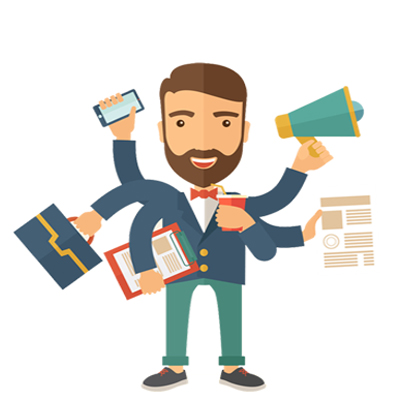How Multitasking Affects Productivity?
 Multitasking means constantly switching between tasks, and sometimes that can destroy your productivity. Countless studies have been conducted to determine multitasking’s impact on the brain and productivity. A Stanford University study found that heavy multitaskers were mentally less organized, struggled at switching from one task to another, and had a hard time differentiating relevant from irrelevant details.
Multitasking means constantly switching between tasks, and sometimes that can destroy your productivity. Countless studies have been conducted to determine multitasking’s impact on the brain and productivity. A Stanford University study found that heavy multitaskers were mentally less organized, struggled at switching from one task to another, and had a hard time differentiating relevant from irrelevant details.
Since then, more research has emerged supporting the idea that multitasking may not be the best way to get as many tasks as possible done throughout the day. It comes down to our ability to focus – we are most effective when we focus our attention on one thing at a time. A recent study found that balancing more than one task at a time actually hinders employee performance.
Many people believe multitasking is focusing on more than one task at a time, which is actually impossible. What’s really happening is you’re shifting attention from one thing to the next – music to email to chat alerts – every few seconds, without ever being fully present on one task.
Keep in mind that these views on multitasking are mostly relevant in the workplace. It is possible to multitask in some scenarios without hindering your overall desired output. Eating and walking, for example, can still be accomplished without a catastrophic end. Folding laundry and watching TV, while also considered multitasking, hardly carries the same weight as texting while driving. Both affect how we learn and work, but as with most things, the situation dictates when it’s appropriate to multitask and when you should focus on one thing at a time.
The benefit or negative impact that multitasking has on productivity is subjective and dependent on the task at hand. Many working women share that they are amazing multi taskers on the weekends when they am juggling laundry, cleaning floors and getting the house back in order. On the other hand, if they’re juggling a conference call, a client email and speaking to a co-worker, that can lead to a horrible mess.
The Negative impact of multitasking
Our brains can’t handle several complex tasks at once. With the rise of smartphones, that can mean texting or listening to music while working can actually impair our productivity. No matter what you’re doing, multitasking will hurt your efficiency to some degree.
“Multitasking can hurt efficiency for a couple reasons: It takes time to switch gears, and the process of switching ‘working sets’ of information can lead to errors and mistakes. Being efficient at multitasking really just means trying to make those costs as small as possible.
According to the Bryan College Research study, Millennials switch from platform to platform 27 times per hour. Additionally, multitasking lowers IQs by 15 points during cognitive tasks and decreases emotional intelligence and brain density over time.
We crave constant stimulation and fast rewards and lots of variety, so we bounce around in the modern, digital environment trying to do a bunch of things really fast, all at once. The results are bad on every level – sloppy work, poor decision-making, increased stress, lack of creativity etc.
Multitasking is unproductive because less quality work is produced, more mistakes are made, and more money is lost.
How to Work more Efficiently
The first step to being more productive is creating a list of things you need to get done, scheduling time to complete tasks, and devoting yourself fully to a task without the distractions of a smartphone or even email. It could be useful to even schedule in some time for interruptions.
Another important step is limiting distractions. It is definitely important to prioritize and schedule your work, but also make sure you’re focused on that work when you do it. Avoid having to make so many mental shifts to unnecessary things. Put notifications on mute, eliminate outside distractions. When you do have to make mental shifts, don’t switch back and forth.
If you need to switch tasks, write down what’s important about the current task before switching to a new one. This can help you let go of the important information from the prior task so you can fully focus on your next job.
Because you have a summary of the important info, you are less likely to lose track of your thoughts throughout the day.
How to Help your Team avoid Multitasking
One of the best things you can do to help prevent your employees from multitasking is encourage breaks. If a worker is overwhelmed by tasks without a lull in their work, they’ll feel more pressured to multitask. To avoid this, encourage your workers to unwind throughout the day.
You can also build a culture of slower but more purposeful thinking. Multitasking is often a result of outside distractions and stressors. It’s bound to happen and shouldn’t be punished. However, encourage other methods, like slower and more careful thinking.
At the end of the day, with all the distractions available to us, and with the freedoms we expect in a modern workplace, it’s unrealistic for employers to think they can control the amount of multitasking. Instead, they should celebrate approaches to work that are the opposite of impulsive and unfocused.


